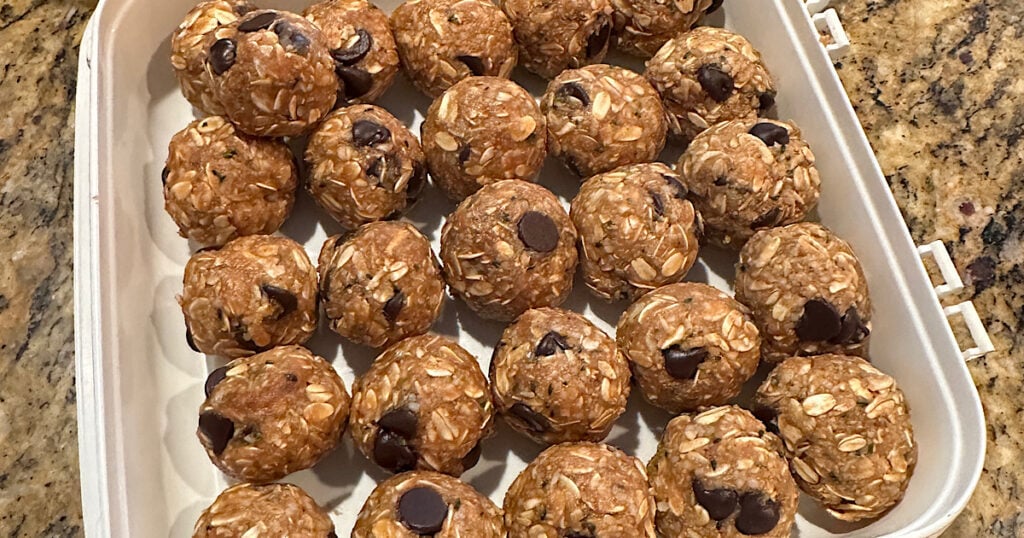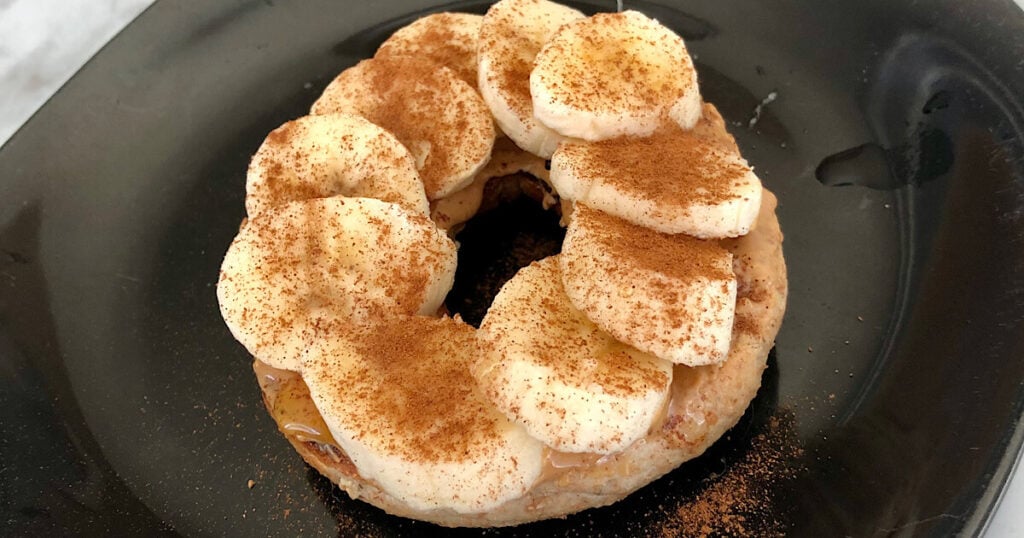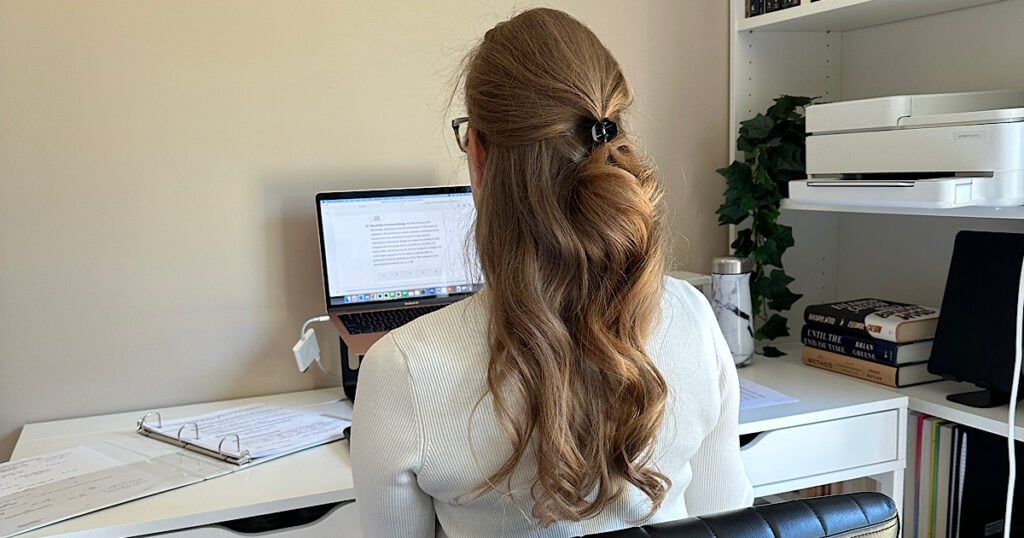Last Updated on December 15, 2025 by Alexandra Markin, Dip.Mgmt.St.
If you’re a student, you know how it goes. Sometimes there are days when you’re so tired that even thinking about studying feels impossible.
Whether it’s after a long day, a poor night’s sleep, or just one of those weeks when life feels like too much, the course work doesn’t stop. You still have assignment deadlines, readings, and projects piling up.
As an online undergraduate student and full-time study content creator, I know exactly how this feels. There have been times where I’ve literally had to peel myself off the couch because something was due.
So if you’re reading this in total brain fog with a half-full cup of coffee, you’re in the right place.
This post gives you the exact steps I use to study when I’m completely exhausted – but still need to show up for myself.
Prep Your Body and Brain Before You Start
Before you even sit down to study, do these 5 simple things to help reset your physical and mental energy.
1. Drink a Glass of Water
A 2019 Scientific Reports study found that even minor dehydration reduces neural activity in key brain regions – areas involved in attention, memory, and emotional regulation. Participants showed slower responses and lower activation when dehydrated, but drinking water reversed these effects.
So before you reach for more coffee, drink a big glass of ice water instead. It will boost your attention and memory, and I find the ice acts like a bonus pick-me-up.
TIP: If you’re feeling really thirsty, mix a pack of electrolytes into your water. My favourite brand is Hydralyte and I always have these on hand.
2. Wash (or Splash Water) on Your Face
I find washing my face makes a HUGE difference in my energy levels, especially on those mornings when I wake up already feeling tired or those nights when all I want to do is go to bed. It signals to my brain that it’s time to get to work.
Even though I usually wear makeup most days, I keep it super minimal when I’m low on energy. Just doing 5-minute makeup makes me want to tackle my to-do list with more intention.
If I’m studying in the evening after a long day, I’ll take off my makeup and wash my face before I even open my laptop so once I’m done studying I can crash straight into bed without another step. Skincare = self-care.
TIP: If you have a go-to facial mist, keep it at your desk for a hydrating refresh. My favourite is Avène Eau Thermale Facial Mist.
3. Move Your Body for 2 Minutes
You’re already tired, so 2 minutes is all you need to get some extra blood flow to your brain.
Any of these things are great:
- Light stretching.
- Walking around your house.
- Doing a short yoga flow (my favourite).
- Getting fresh air – let the dog out for a pee, take out the garbage, etc.
4. Get Dressed
Pyjamas are out, real clothes are in. Dressing for success not only helps you feel your best, but it also helps you feel less like it’s time for bed. Whether it’s morning or night, put on something to help you feel productive.
TIP: I have matching loungewear sets for both winter and summer that are comfortable yet still make me feel put together when I’m staying home. They go a long way in making me feel like I have my life together!
5. Eat a Small, Energy-Boosting Snack


Before you start, have a SMALL snack that contains both protein and complex carbs (that contain some natural sugar if you’re feeling like something sweet).
Sometimes tiredness is less about sleep and more about blood sugar.
My favourites are:
- A no-bake 4 ingredient peanut butter energy bite – I add 2 tablespoons of hemp hearts to the linked recipe
- Half a whole grain English Muffin + 2 teaspoons of natural peanut butter + 1/2 banana
- Apple slices with peanut butter or a hard-boiled egg
- Whole grain crackers with hummus
The key here is to avoid heavy meals (like a full plate of pasta or a big fried breakfast) or a large portion of high sugar/salty snacks (like candy, chocolate bars or potato chips).
Set the Right Study Environment
Your study environment is huge when you’re tired. Your surroundings either drain or support your energy, and all these small shifts add up.
6. Tidy Your Study Space
When I’m exhausted, a messy desk is the fastest way to make me want to do literally anything else besides study (I think I need to put that pile of laundry away first…)
Clearing off those items you’ve just dumped on your desk and gathering up your pen collection doesn’t just make things look better, it actually helps your brain focus. Physical clutter leads to mental clutter, so when you’re low on energy you need every bit of clarity you can get.
Setting out your textbook, laptop and notebook on a clean surface gives that “I’m ready” feeling.
Light a candle or put on your diffuser if that’s your thing. It’s all about making your space feel calm and focused.
7. Adjust the Temperature
Studying in an environment either too hot or too cold can worsen your already low fatigue.
I can’t study when I feel too cold. I hate it when you try and study at a library or coffee shop and they have the air conditioning blasting. It doesn’t keep me awake, it just makes me irritable and unable to concentrate.
And it’s not just me – there’s a study to prove it. Research conducted by the National Library of Medicine in 2022 on female higher education students found that cognitive performance, especially speed and accuracy, peaked when indoor temperatures were maintained between 20 -23°C (68–73°F).
- Too COLD? Layer up in a cozy sweater, fluffy slippers or socks and grab a throw blanket and a steaming mug of herbal tea.
- Too HOT? Change into clothing that is made with natural fabric (think cotton or linen), drink ice water or invest in a small desktop fan.
8. Use Proper Lighting
Brighten your space, brighten your brain.
Lighting affects how awake you feel. If your space is dim or shadowy, your brain gets the message that it’s time to rest, not study.
Turning on a bright lamp or letting in natural light instantly helps me feel more awake and alert. It signals to your body that it’s daytime, even if it’s not or your body says otherwise.
If you’re studying at night, go for a bright desk lamp that keeps things cozy but still functional.
9. Remove Distractions
When you’re tired, setting up a distraction-free zone helps protect your focus, what little of it you have left.
Turn off the TV and close any open tabs unrelated to studying. Turn off all phone notifications (or ativate do not disturb mode). Or, put your phone in another room if you’re tempted to check it.
You can also try a focus app like Forest, which helps you stay off your phone by growing a virtual tree that flourishes while you work and dies if you leave the app.
If you live with family or roommates, let them know you need undisturbed time to study.
10. Study Upright With Proper Posture
This means no couches, beds or beanbag chairs. Sitting in an actual chair makes a huge difference in how alert and focused you feel.
I know the bed and couch is tempting, but your brain picks up on those physical cues. At the beginning of my degree I used to try reading on the couch when I was tired, but quickly found out this lead to getting nothing accomplished.
11. Put on a Study Playlist or Ambient Sounds
This one is personal – some students swear by studying to music or sounds, whereas others need complete silence.
If I’m at home, I prefer silence. However, I tend to study well in a public setting such as at a coffee shop where the buzz of background conversation helps me stay alert.
If you study well with a curated playlist, ambient sound (like rain or nature) or classical music, put on your favourite background noise to boost your mental energy.
12. Switch Up Your Study Environment
Sometimes no matter how tired I am, I just have to get out of the house if I want a chance of getting anything done.
Heading to a coffee shop, the library or even sitting outside for a bit is enough to reset your brain and give you a second wind. I find that being around other people who are also working (like at Starbucks or the library) helps me stay energized even if we’re all doing our own thing.
If leaving the house isn’t an option, try moving to a different area of your space, like sitting on the patio or bringing your laptop to the kitchen table.

Modify Your Study Approach
Once your environment is set and your body feels a bit more awake, it’s time to tweak how you study because when you’re tired, your usual methods need a slightly different approach.
On tired days, progress matters more than speed.
13. Use a Shorter Version of The Pomodoro Technique
I love the Pomodoro Technique for studying, especially when I’m feeling unmotivated. But when I’m tired, the traditional 25 minutes on, 5 minutes off feels like an eternity.
Try 15 minutes of focused studying followed by a 5 minute break – just enough to get into a flow without feeling overwhelmed.
So set a timer and tell yourself “Just focus for this one short block.” More often than not, you will surprise yourself and keep going.
Short bursts of effort feel more doable when your energy is low, and they still add up to real progress.
14. Prioritize Easier Tasks First
Build momentum first, then tackle the tough tasks. It’s not about avoiding the hard work – it’s about setting yourself up to actually get through it.
Reviewing notes, organizing study session to-dos or rewatching a short lecture are all low-effort wins that help me ease into study mode on those days I can hardly bring myself to sit at my desk.
Once I’ve checked off a few small tasks, I usually feel more motivated to take on the harder stuff. It’s a great way to ease your mind into work mode.
15. Focus On One Small Goal At a Time
Don’t plan to finish an assignment or read an entire chapter. Instead, break down goals even further into micro tasks:
- Review 5 flashcards.
- Read and take notes on 1 textbook section.
- Watch 1 lecture video.
- Do 1 question.
- Write 1 paragraph.
Once I finish that small goal, I check it off (this is why I LOVE using a detailed study planner) and then decide if I have enough energy to move to the next.
16. Alternate Active and Passive Tasks
Switching between different types of tasks can help you stay awake and engaged when all you want to do is sleep.
Pair something mentally active with something more passive. For example:
Alternating tasks gives your brain a chance to rest without losing focus. Just answering review questions alone may seems like too much effort on those tired days, and doing reading only might make you actually fall asleep.
Stay Alert and Keep Focused
Remember, every minute you push through is a win. Use these strategies to power past the fatigue and keep moving toward your goals.
17. Chew Gum
This might sound surprising, but a 2015 study by the National Library of Medicine found that university students who chewed gum during study sessions showed an improvement in sustained attention and self-reported productivity.
I like mint flavoured gum the best because I find the menthol invigorating, but it’s important to chew whatever flavour you like!
Chewing gum also gives your mouth something to do, which can help stop mindless snacking.
18. Stand Up Intermittently
Taking short breaks to stand up can help you fight off that tired and sluggish feeling by getting your blood flowing.
I like to stand up and walk around my room or kitchen island while I ponder a concept I’ve just learned or think of how to answer a question.
Some student swear by using a standing desk. Or, if you have a counter height island you can alternate between sitting and standing just by moving your laptop.
19. Talk out Loud
Whether you’re explaining a concept to yourself, reading your notes aloud, or pretending to teach an imaginary classmate, saying things out loud can help bring your thoughts (and energy) into focus.
Taking a step back and speaking the material out loud also helps your brain process it differently while keeping you more alert.
If you live with others, just warn them ahead of time, or grab your headphones and pretend you’re on a Zoom call!
20. Take a Power Nap
Sometimes the best thing you can do when you’re tired (but still need to study) is take a nap – really!
A 2010 study by the National Library of Medicine found that brief naps of just 5–15 minutes produce immediate improvements in alertness, mood, short-term memory and reaction time, with the benefits lasting 1–3 hours afterward.
I used to be terrible at napping, but a little ways into my degree I found power naps aren’t just a luxury. They’re a proven study tool that help sharpen your focus, refresh your memory and make studying more effective.
21. Make a Coffee
When you’re tired, sometimes all you need is a little hit of caffeine. Studies show that drinking coffee for studying can increase alertness and improve focus.
I find an iced latte with a shot of syrup works much better for me than a regular drip coffee.
This is my go-to recipe that makes just enough to give me that shot of energy:
- 1 pod of Nespresso Stockholm Lungo (my current machine uses the Original capsules)
- 1/2 cup of Earth’s Own Original oat milk
- 1 pump of Torani Vanilla Bean syrup
- Lots of ice
However, it’s best to drink coffee in moderation to avoid getting jittery (terrible when you’re trying to take neat notes) and avoid sleep disruption.
22. Study With Others
If you have the option, studying with even just one other person can help you feel more energized as long as you actually study and not just get coffee and chat over your open books.
Whether it’s a friend or classmate at the library or just sitting near other people who are working at a coffee shop, the shared focus helps me stay accountable and less tempted to throw in the towel.
If you’re an online student like me, studying with others in person is often not possible.
However, here are my favourite ways to study with others virtually:
- Join a Discord study group (many online universities have (unofficial) channels.)
- Participate in a livestream “study with me” on Instagram, TikTok or YouTube. Many study creators host study times where you can join in.
- Set up a Zoom call with a friend or classmate.
- Study over a FaceTime call.
23. Know When to Quit
There’s a difference between pushing through and burning out, and sometimes the best thing you can do is call it a night.
If you’ve tried all of the above tips and you’re still not able to make progress, it’s okay to stop. Learning takes energy, and if you’re completely drained you’re not absorbing anything anyway.
Signs it’s time to stop studying:
- You feel irritable, frustrated or anxious beyond your norm.
- You feel physically uncomfortable – headache, eye strain or sore/tense neck and shoulders.
- You’re making simple mistakes or forgetting things you normally know.
- You’re rereading the same paragraph over and over but nothing is sinking in.
- You’re studying out of guilt, not productivity.
- You’ve accomplished your planned study tasks but feel tempted to keep going.
Self-discipline means knowing when to keep going and when to rest. Pushing when you’ve physically and mentally hit your limit is what leads to student burnout, so learn to give yourself permission to stop when you need to. We are only human, after all.
Next Steps
Studying when you’re tired isn’t easy, but it is possible with the right mindset, strategies and a bit of self-compassion. The next time you need to study when you’re tired, try a few of these tips and see what works best for you.
A degree is a marathon, not a sprint. It’s completely normal when some days are slower than others. What matters is that you keep showing up for yourself, day after day.
If you found this post helpful, share it with a study buddy, sign up for my email list below and follow me on Instagram and Pinterest to join our online student community – you don’t have to go through your study journey alone!




